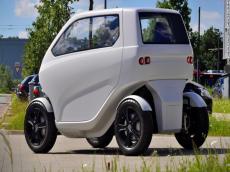Today.Az » Weird / Interesting » 'Incredible shrinking car' drives sideways to park in tiny spaces
09 May 2015 [09:04] - Today.Az

But now a team of German engineers have come up with an ingenious solution -- a "flexible" electric vehicle capable of shrinking, driving sideways (think like a crab) and turning on a dime. The EO Smart Connecting Car 2 is an innovative design from DFKI Robotics Innovation Center, based in Bremen, Germany, where a team of software developers and designers, as well as electronics and construction engineers, have been refining the smart micro car project for the last three years. First announced in 2012, the team have moved onto their second iteration of the vehicle. It drives like a traditional car but because each wheel is powered by its own motor, it also has the capability of driving sideways, allowing it to slide into tight spaces in urban areas where parking is limited, explains Timo Birnschein, project manager for the vehicle. He adds: "The whole process -- the transition between normal driving and driving sideways -- takes about four seconds." Shrink and driveThe prototype has a top speed of 65 km/h (or 40mph) and can travel 50 to 70 kilometers (30 to 44 miles) on a single four-hour full charge of the battery. But it's the two-seater's ability to shrink to around 1.5 meters in length that has the team excited about its uses in future cities, says Birnschien. "It is able to reduce it's own size by about 80cm, which makes it almost as small as a bike in length. And with this kind of feature you can go into very tiny parking spaces," he says. "You are still able to turn on the spot, you are still able to drive sideways and you are still able to connect to charging stations, for example." Looking like part "Transformer" and part DeLorean out of "Back to the Future," the car reduces its size by partly folding itself. It shifts the rear axle to the front and slides on a set of rails which raises the interior upwards, while still remaining comfortable for the passenger. Touted as a "micro car for a megacity," the team are working hard to make their vehicle roadworthy and envision it as a communal public resource, similar to existing urban car-sharing schemes. The idea is that when you need a car, you could head to your nearest docking station and select the vehicle that's charged enough to drive the distance you need. It would then detach itself and you would be on your way. "[It] is very comparable feature-wise to the first prototype," says Birnschein. "The second version is much more reliable and almost road-legal. It's not really, but it's almost there and we are trying to bring this car to the road -- but it's a big hassle to be honest because we have so many new technologies in the car that the technical advisory guys are skeptical." He adds that the team have invited several manufacturers to test drive the vehicle, with positive response, but the enthusiasm ends there. "The problem is for most car manufacturers, they are not really interested if they didn't invent it themselves. They may buy from Bosch or Siemens or whatever, technology parts like ESP and other things, but not complete systems." But his team remain undeterred as they continue working on autonomous features like auto pilot and self parking. Meanwhile Birnschein likens the situation to the rise in smartphones over the last decade -- from non-existence to oversaturation. "It will be the same with computer power and autonomy," he says. "In the next 10 years we will most likely see autonomous cars from big car manufacturers -- Mercedes S class will have autonomous functions within three or four years. Some of other manufacturers like GM announced they will have semi-autonomous cars by 2020. And many other car manufacturers are already working on this type of technology. "They are driving all the time on the autobahn with autonomous vehicles. I believe it will be coming -- it will be there within the next decade." /By CNN/
|